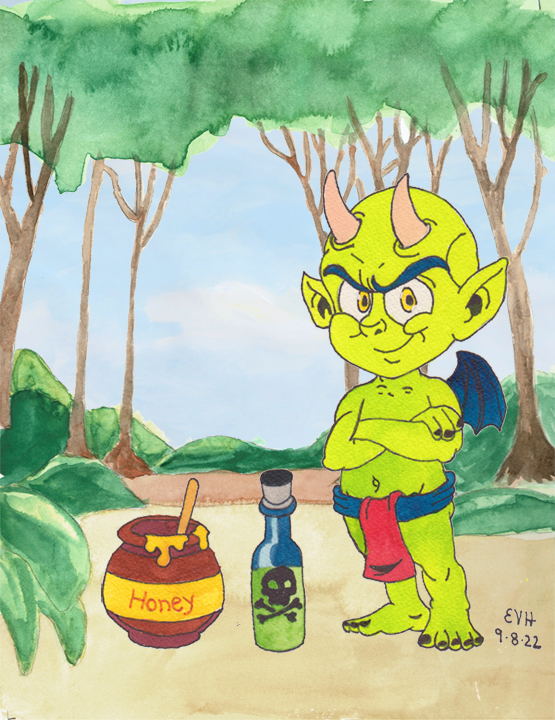
Jataka 366
Gumbiya Jātaka
The Story of Gumbiya
as told by Eric Van Horn
originally translated by H.T. Francis and R.A. Neil, Cambridge University
originally edited by Professor Edward Byles Cowell, Cambridge University
The Buddha often used the simile of honey that disguises something evil or unskillful. The honey is temptingly sweet, but it can cover up something poisonous. In this case it is lust. In other instances he says that anger has a “honeyed tip and poisoned root.” This simile can apply to almost any sense desire.
“Poison like honey.” The Master told this story while he was living at Jetavana. It is about a monk who regretted ordaining. The Master asked him if it were true that he regretted it. “It is true, holy sir,” he said. “What have you seen to cause this feeling?” the Master asked. When the monk replied, “It was because of the charms of a woman,” the Master said, “These five qualities of desire are like the honey sprinkled over with deadly poison and left in the road by one Gumbiya.” And at the request of the monk he told this story from the past.
Once upon a time in the reign of Brahmadatta, King of Benares, the Bodhisatta was reborn into a merchant’s household. And when he had grown up, he set out from Benares with merchandise for trading on 500 carts. When he reached the high road at the entrance to a forest, he called together all the members of his caravan and said, “Lo! On this road there are leaves, flowers, fruit and the like that are poisonous. When you eat, make sure that you eat no strange food without first asking me about it. Demons set baskets of fresh rice and various sweet wild fruits in the road. Then they sprinkle poison over them. Be sure not to eat anything without my consent.” And after uttering this warning, he proceeded on his journey.
Then a certain Yakkha (a type of demon), named Gumbiya, strewed leaves on a spot in the middle of the forest. He dropped honey over them and then covered them with deadly poison. Then he wandered along the road, pretending to tap the trees as if he were looking for honey. In their ignorance the men thought, “This honey must have been left here as an act of merit.” Then they ate it and met their deaths. Then the demons came and ate their flesh.
Some naturally greedy men who belonged to the Bodhisatta’s caravan, at the sight of these dainties could not restrain themselves. Despite the Bodhisatta’s instructions, they ate them. But those that were wise said, “We will consult the Bodhisatta before we eat. They stood holding it in their hands. And when he saw what they had in their hands, he made them throw it away. Those that had already eaten the whole of it died. But to those who had eaten only half of it, he administered an emetic (something to make you vomit), and after they had vomited, he gave them sweet medicines. And so by his supernatural power they recovered.

Figure: Beware of feisty Yakkhas
The Bodhisatta arrived safely at his destination, and after disposing of his wares, he returned to his own house.
Poison like honey in look, taste, and smell,
Was laid by Gumbiya with purpose fell.
All who as honey ate the noxious food,
Through their own greed did perish in the wood.
But they who wisely from the bait abstained,
Were free from torture and at peace remained.
So lust, like poison bait, for man is laid.
His heart’s desire has oft to death betrayed.
But who, though frail, compulsive misdeeds forego,
Escape from bonds of suffering and woe.
The Master, after delivering these verses inspired by perfect wisdom, taught the Four Noble Truths. At the conclusion of the teaching, the backsliding monk attained stream-entry. Then the Master identified the birth: “At that time I was that merchant.”
